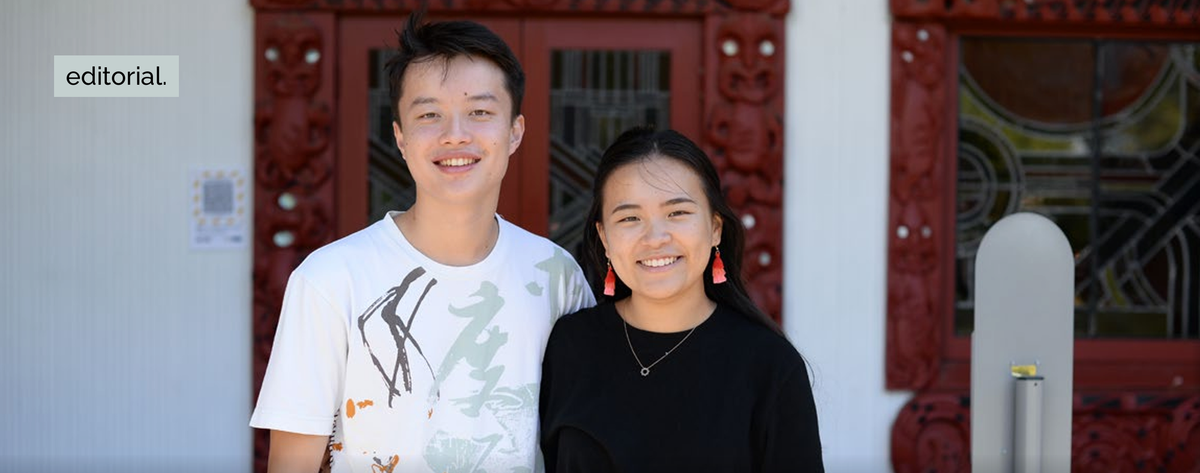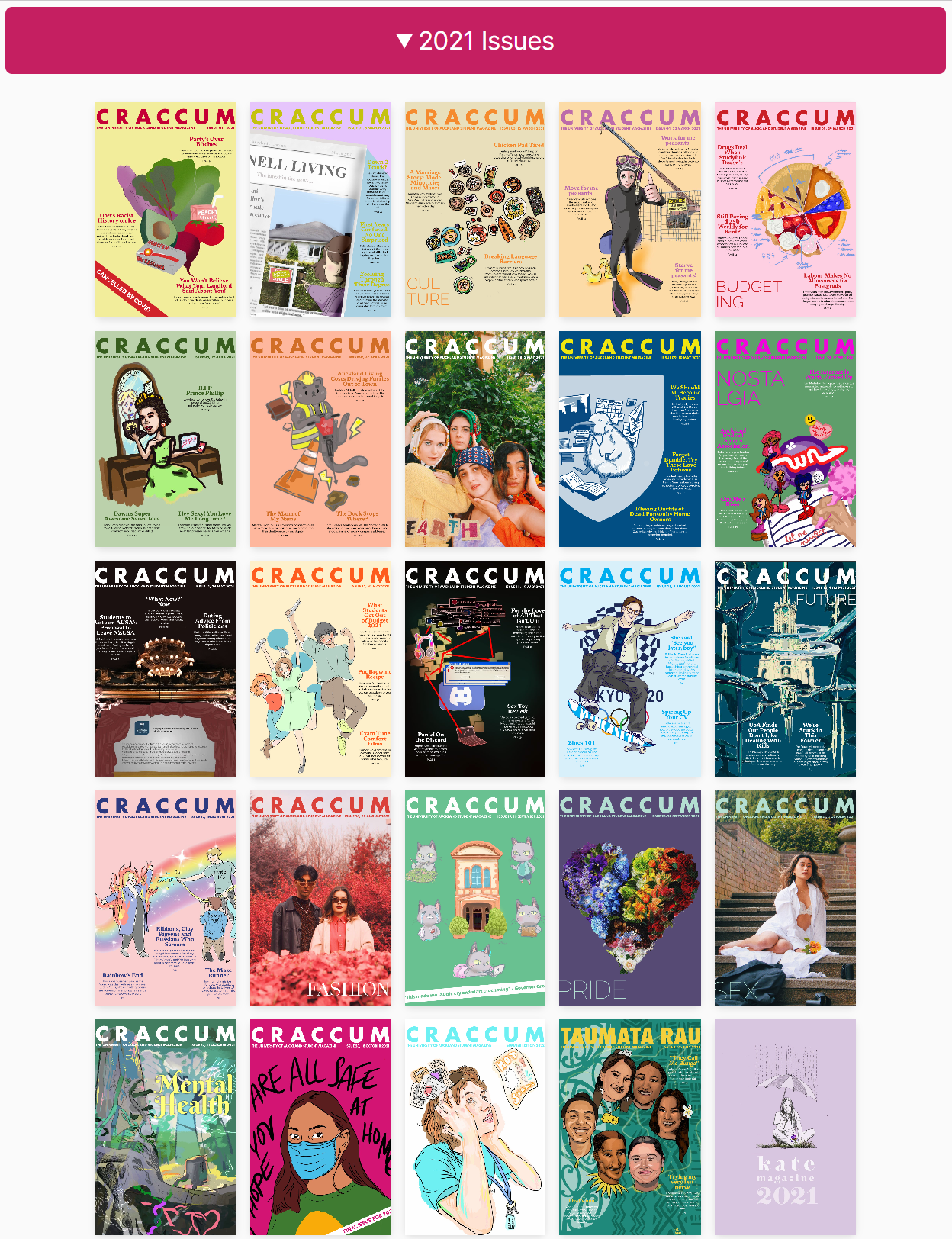Interview with Brian & Eda | Co-Editors of Craccum 2021
I asked Eda & Brian a few questions about their time as Craccum's Co-Editors for 2021, and asked them for a bit of advice they'd pass on to future Editors as well.

The future was uncertain back in 2021, with the COVID showing no signs of easing up. It was at this challenging time that Eda & Brian stood up to helm Craccum through the second year of the pandemic, having worked for Craccum in 2020 (Brian as Subeditor and Eda as Visual Arts Editor). Yet despite the on and off lockdowns Brian & Eda not only kept up Craccum's weekly publishing schedule throughout the year, but they also innovated and pushed the magazine to new heights, helping establish the now annual Taumata Rau editon of Craccum and working with Stuff to secure third-party funding for a Te Ao Māori editor.
Under their leadership, Craccum made a big splash at the Aotearoa Student Press Awards in 2021. Although only taking home Best Column, they were runners-up for Best Website, Best News Story, Best Opinion Writer, Best Student Politics Coverage, Best Creative Writing, Fiction, or Poetry, Best Design, Best Māori Coverage, Best Photographer and Best Editorial. Awards aren't everything, but if that isn't a marker of what an all-around strong year 2021 was for the magazine, I don't know what is.

This is the second in a series of interviews on Craccum's legacy. I asked Eda & Brian a few questions about their time as Editors in 2021, and asked them for a bit of advice they'd pass on to future Editors as well. Without further ado...
How would you describe the spirit of Craccum in your year? Would you say it was a continuation or break from the style of the previous year?
Eda: Unwaveringly joyful and resilient. In surviving our first year of lockdown, students seemed to find a shared sense of humour to power through and I think Craccum in 2021 embodied that sense of camaraderie while still supporting a robust quality of journalism.
Brian: Eda and I were both on the 2020 team, and felt a lot of pressure from the high journalistic quality of that year. I do think a lot of people arrived into 2021 suffering from COVID fatigue. So, while keeping pressure on the University, we wanted to balance it with positive stories.
Brian: In one aspect, this was writing humour. But it goes deeper than that. We featured stories on our talented students, such as those working on side hustles outside of their degree. Also, we published stories about background and culture that we thought would resonate with students. For instance, we highlighted the dire lack of interabled spaces on campus and talked about the importance of food in immigrant cultures.
What was something new to Craccum you introduced in your year? What was the rationale behind it?
Brian: The author headshots, which Eda suggested, is one of the first things I think of. On the surface, it was a simple idea, but putting a face to each of our writers brought a sense of community. Coming out of a year of lockdowns, and growing our contributors out from a small team, it was important the recognise the people that help deliver Craccum.
Eda: We got Stuff NZ to sponsor a new role for a Māori editor. It was obvious that in its decades of existence, Craccum had never had a paid position for Māori editorial leadership. This meant that how we represented the voice of the student body was skewed away from tauira Māori and we had the responsibility to do something about it. To support the development contributors, we decided that there should be an edition of Craccum (which later came to be known as Taumata Rau) which was led and contributed solely by Māori and Pasifika students.
Eda: We also partnered with Shads to give away a $50 bar tab to a 'contributor of the week'. It always felt icky not being able to compensate our contributors so we tried to find ways to recognise their work as much as we could.
What was an issue or article you remember you were particularly proud of and why?
Eda: The first issue of 2021 sits fondly in my mind, probably just because we managed to get it out there even though it ended up being lockdown. It's aesthetically fresh and fun, packed with tongue-in-cheek content which set the tone for the year to come.
Brian: Any week we didn’t make a mistake on the crosswords or sudoku!
Brian: Kidding aside, I think there were lots of great moments. It was awesome to support Mairātea and Aria in producing the first Taumata Rau issue. Also, Eda did an excellent job of outlining Zuru’s shady involvement in the Marketing course.
Brian: One thing I remember being proud of was our response to ‘In Defence of Science’. Having top professors sign an open rejection of mātauranga Māori was damaging to our university. Condemning this on behalf of the student body was important to us, and the values we built our year on top of.
What do you think was the greatest challenge UOA students faced in your year? How did Craccum report on it/make a difference?
Brian: Probably the looming threat - expectation almost - for another Covid lockdown. The University copped a lot of flack for making impulse decisions, having uncertain implications on its students. We used Facebook to deliver reliable updates, and shared student perspectives through Whakarongo Mai. Individual voices are monitored and heard – the University reminded us of that themselves through their infamous social media surveillance.
Eda: What Brian said :)
What was one thing you would do differently running the magazine if you had to do it all over again?
Eda: I don't think there's anything I would've done differently as all the learnings from it were important and being perfect isn't the point of student magazine.
Brian: It would be fun to do it all again! But part of what makes Craccum special is that each editor brings something new to the table. So, I’m pretty content that my best ideas have already been left on the table.
Brian: That being said, it’s time to move on from our history of being the ‘Auckland University College Men’s Common Room Committee’. But we do like the name CRACCUM. How about making it the ‘Auckland University Choir Mastering Chappell Roan Covers’?
Anything you’d like to say or pass on to future Craccum editors?
Brian: You can’t please everyone, so please yourself first and foremost. Make a magazine that you want to pick up and read. Readers can always sense your enjoyment. Also, find opportunities to write content (outside of the editorial) when you can.
Eda: We spent a significant amount of time defending our weekly print run and budget with AUSA. Such a proposal to cut down our budget and reduce our print run was sent to us pretty much straight after we signed on as editors and before we even had a chance to plan our first edition. I'd say to editors to be ready to fight for the institution of student magazines and get to know other student mag editors across the country earlier on in the year. These are the people who will have your back.
If you could ask a question to previous Craccum editors for advice, what would it be?
Brian: How do you view success of the magazine? There are so many different metrics, for better or for worse. It can be engagement, the quality of the stories, or the uniqueness to student culture. Every perspective brought to the table is valuable, and that’s why delivering the magazine without a team behind it wouldn’t work.
I'd like to thank Eda and Brian for opening up about their experiences working with Craccum. Their legacy in Craccum can still be felt today, for example in our Whakarongo Mai column, which I borrowed from their magazines.
I think Brian and Eda would agree Craccum wouldn't be possible without the mahi of their team and contributors backing and supporting them. I would also like to acknowledge Craccum's 2021 staff:
- Flora Xie (Subeditor)
- Sophie Sun (Visual Arts Editor)
- Lachlan Mitchell (Lifestyle Editor)
- Madeleine Crutchley (Arts Editor)
- Naomii Seah (Features Editor)
- Mairātea Mohi (Te Ao Māori Editor)
- Karanama Ruru (Chief Reporter)
- Jessica Hopkins (News Editor)
[Did you notice three of Craccum's future editors were in that staff list?]
You can read 2021's Craccums online now on our archive page. While still a work in progress, you can now read Craccums from the years 1927-1949 and 2016-2025 on our website. (Including my first contribution in way back in Issue 20, 2021.)





